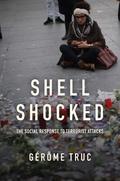Shell Shocked
The Social Response to Terrorist Attacks

1. Auflage November 2017
280 Seiten, Softcover
Wiley & Sons Ltd
Kurzbeschreibung
What is it that leaves us shell shocked in the face of the massacres carried out in New York on 9/11 or in Paris on 13 November 2015? How are we to explain the intensity of the reaction to the attacks on Charlie Hebdo? Answering these questions involves trying to understand what a society goes through when it is subjected to the ordeal of terrorist attacks. And it impels us to try to explain why millions of people feel so concerned and shaken by them, even when they do not have a direct connection with any of the victims.
In Shell Shocked, sociologist Gérôme Truc sheds new light on these events, returning to the ways in which ordinary individuals lived through and responded to the attacks of 9/11, of 11 March 2004 in Madrid and 7 July 2005 in London. Analysing political language and media images, demonstrations of solidarity and minutes of silence, as well as the tens of thousands of messages addressed to the victims, his investigation brings about the complexity of our feelings about the Islamists' attacks. It also uncovers the sources of the solidarity that, in our individualistic societies, ultimately finds expression in the first person singular rather than the first person plural: 'I am Charlie', 'I am Paris.'
This timely and path-breaking book will appeal to students and scholars in sociology and politics and to anyone interested in understanding the impact of terrorism in contemporary societies.
What is it that leaves us shell shocked in the face of the massacres carried out in New York on 9/11 or in Paris on 13 November 2015? How are we to explain the intensity of the reaction to the attacks on Charlie Hebdo? Answering these questions involves trying to understand what a society goes through when it is subjected to the ordeal of terrorist attacks. And it impels us to try to explain why millions of people feel so concerned and shaken by them, even when they do not have a direct connection with any of the victims.
In Shell Shocked, sociologist Gérôme Truc sheds new light on these events, returning to the ways in which ordinary individuals lived through and responded to the attacks of 9/11, of 11 March 2004 in Madrid and 7 July 2005 in London. Analysing political language and media images, demonstrations of solidarity and minutes of silence, as well as the tens of thousands of messages addressed to the victims, his investigation brings about the complexity of our feelings about the Islamists' attacks. It also uncovers the sources of the solidarity that, in our individualistic societies, ultimately finds expression in the first person singular rather than the first person plural: 'I am Charlie', 'I am Paris.'
This timely and path-breaking book will appeal to students and scholars in sociology and politics and to anyone interested in understanding the impact of terrorism in contemporary societies.
Acknowledgments.
Introduction: Terrorist attacks as a test.
Part I: What is happening to us.
Chapter 1: Under attack.
9/11 live: accident, terrorist attack, or act of war?
The view from Europe: from Western solidarity to a cosmopolitan perspective.
Chapter 2: Experiencing your 'own' 9/11.
11 March attacks like a 'new 9/11'.
7 July 2005, a 'British 9/11?.
Chapter 3: To show, or not to show, violence.
The place of the dead.
The ethics of iconographic decisions.
Chapter 4: Demonstrating solidarity.
The attacks as a 'time to demonstrate'.
Why demonstrate after an attack?
Chapter 5: Observing silence.
A ritual of collective mourning.
A problem of moral equivalence.
Part II: What touches us.
Chapter 6: Terrorist attacks and their publics.
From written reactions to the concerned publics.
In what capacity an attack concerns us.
Chapter 7: The meanings of 'we'.
Above and below the level of the nation.
World cities and the test of terrorism.
Chapter 8: The values at stake.
Reactions to terrorist attacks as value judgments.
The banal pacifism of the Europeans.
Chapter 9: The attacks in persons.
The singularization of the victims.
Reacting as a singular person.
Chapter 10: Solidarity in the singular.
The attachment to place.
The coincidence of dates.
The homology of experiences.
Conclusion: 'There's something of Charlie in all of us'.
Selective bibliography.
Notes.
Index.
Jeffrey C. Alexander, Yale University


